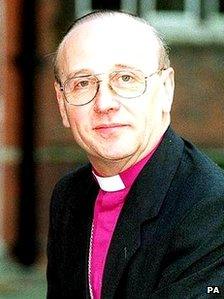Lord Hope denies abuse claim 'negligence'
- Published

David Hope was Archbishop of York from 1995 to 2005
Former Archbishop of York David Hope has "strenuously denied" he "acted negligently" in not referring sexual abuse complaints against a Church of England cleric to police.
The Times said he was told of claims against ex-Dean of Manchester, Robert Waddington, in 1999 and again in 2003.
They involved an Australian schoolboy and a Manchester Cathedral choirboy.
The now Lord Hope said he had acted strictly in line with Church child protection policy of the times.
'Deeply sorry'
In 1999, allegations were put to Lord Hope that Mr Waddington had abused a pupil while he was head teacher at a school in Queensland many years earlier.
And in 2003, a former choirboy at Manchester Cathedral claimed he had been abused by Mr Waddington during the 1980s.
Mr Waddington, who was Dean of Manchester Cathedral from 1984 to 1990, died in 2007.
He denied the allegations.
Following the 1999 complaint, Lord Hope wrote to the North Queensland Diocese to say Mr Waddington was "deeply sorry for anything he may have done to offend" and had offered "an unreserved apology".
In a statement released on Friday by the Diocese of Bradford - where Lord Hope serves as an honorary assistant bishop - he said that, throughout his time as a bishop and archbishop, he "always adhered to the statutory practices of the Church of England concerning safeguarding".
"I strenuously deny - and am obviously disappointed at - the suggestion that myself or my team at the time would have acted negligently in this or any other safeguarding matter," he added.
'Ill health'
Lord Hope - who was Archbishop of York from 1995 to 2005 - said the Church's 1999 child protection policy stated there was "no automatic legal obligation on the Church to refer allegations by adults to the police or social services".
He said the policy also stated: "However, it is essential to consider whether children may still be at risk from the abuser or alleged abuser and, if so, to ensure that appropriate steps are taken to safeguard them, and these will involve reporting the matter to the social services or the police."
Lord Hope's statement added that, "in considering whether children would be at risk from Robert Waddington, I decided under these guidelines that this would not be the case given his serious ill health following cancer surgery".
"The following year I revoked Robert Waddington's permission to officiate. He died two years later," he added.
He said the 1999 child protection policy had since been revised "in line with current understanding, as is the case in many other public organisations with a duty of care".
He added: "I am deeply aware of the pain caused to any victim of child abuse, especially at the hands of a trustworthy person within the church.
"I do encourage any person who believes they have been a victim of abuse to come forward and to inform the police."
Greater Manchester Police said it was concerned that the diocese had decided not to report the claims to police while Mr Waddington was still alive.
A spokesman for Manchester Cathedral, meanwhile, said: "We are shocked and saddened by the nature of these allegations relating to events in the early 1980s.
"We want to reassure parents and congregation members that, for a number of years, Manchester Cathedral has had in place a robust child protection policy with CRB [Criminal Records Bureau] checks made on all clergy and those who work specifically with children."
The Diocese of Manchester said in a statement it was "aware of the current allegations of abuse from the past against a former dean of Manchester Cathedral and we are working co-operatively with the parties concerned".
"Manchester Diocese places the highest priority on all child safeguarding issues," it added.
BBC religious affairs correspondent Robert Pigott said the danger for the Church was that the allegations could suggest a culture seeking to protect clergy from scandal.
This comes after it was revealed that clergy accused of sexual abuse in the Chichester diocese were not dealt with effectively.